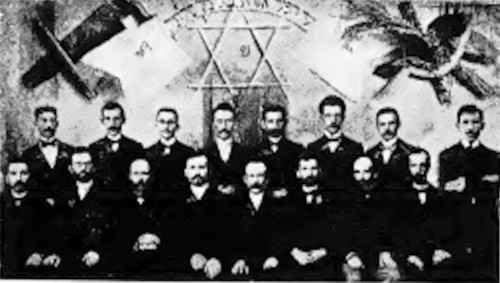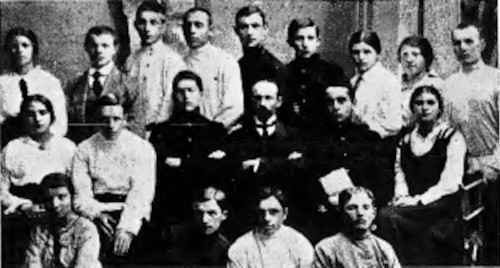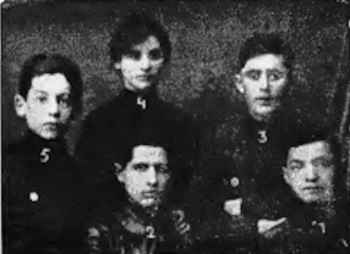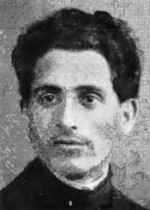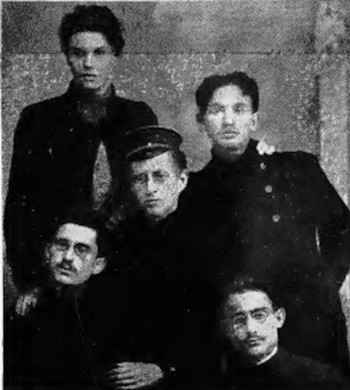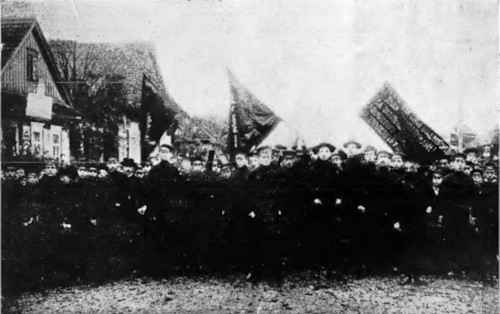[Page 299]
Movements and Parties
The Zionist Movement in Slutsk
by Sh. Menachem
During the time of “Hoveivi Zion”
[Lovers of Zion], before the founding of the Zionist movement by Dr. Herzl,
there were some people in Slutsk who were interested in the subject of the
community in Israel. Among them was the well known grammar
melamed
and librarian, Pesakh Karan [Pesakh Ezra's]. Every
erev [eve of] Yon kipper he would put keiros
[collection plates for Jews living in Israel] in the synagogues and
boteimedrashim [for the settlements in Israel.]
After the first Zionist Congress in 1897, he founded the association “Bnei Zion”
[Sons of Zion] in Slutsk. The head of the association was a certain Dr.
Meltzer who practiced for a short time in Slutsk. The goal of this association
was only to sell shares of the Colonial Bank, and later to market
“Keren-Kayemet” [JNF].
|
|
Executive Committee of “Bnei Zion” in 1900
Sitting from right to left: 1) Zabin, 2) Unknown, 3) Eizyk Ratner, 4) Dr.
Meltzer 5) Shmerek Bailin, 6) Layer Ratner, 7) Shaikevitsh, 8)... Standing: 1)
Abraham Kadish-Ber Epstein's son, teacher and writer, 2) Leib Sadovski, 3)
Dr. Z???? 4) Moshe Ratner, 5)... 6) Hillel Dubrow, 7) Abraham, Moshe Yechil
Epstein's son, 8) Feinberg |
The Zionist youth, also a part of the above-mentioned association, were not too
pleased with the limited activity. They wanted to spread Jewish culture and
Hebrew, so they founded a club and a library. In 1900, there was a schism in
the association and a more progressive association was founded under the name
“Kdima”
[Zionist Youth group], headed by the well-known Hebrew teacher, Hillel Dubrow.
Those who stood with him were the young, talented speaker Aaron Singalowski (at
that time he was known as the President of “ORT”), Y.D. Berkovitsh,
Abraham Epstein, Meier Waksman (later a famous author) and others.
Through the initiative of the “Kdima” Association, the “Tshaine”
was founded, a well-known Zionist club and reading room, and thereby the first
community library in Slutsk with books in Hebrew, Russian and Yiddish. They
also started evening classes for young yeshiva students to learn Hebrew and
Russian.
The Zionist youth (of both sexes) distinguished themselves with their
persistent activities and ideals. After the Kishinev pogrom, thanks to the
initiative of the Zionist youth, a self-defense organization was formed that
had representatives from all segments of the Slutsker Jewish population.
At that time “Poalei Zion”
was also founded in Slutsk under the “Minsk system.” Both sides of
the road were busy during the evening, Shabes (the Sabbath) and
Yontoyvim (high holidays) with the masses of the Slutsker Jewish proletariat.
On one side was the “Bund” SDSR
and on the other side was “Poalei Zion”,
S.S (Zionist Youth group). There were meetings and debates that often ended in
quarrels and fights. Both enemy camps very often organized strikes among the
workers.
Afterwards, when Zionism was officially forbidden by the Czarist government the
Zionist “Tshaine” closed, but the library continued to function for a long time.
After the failure of the first Russian revolution in 1905-1906, youth community
activities were generally weakened, especially Zionist activities. And Slutsk
did not stand down from the general stream that was influenced by the new
tendency in Russian literature,
[Page 300]
|
|
“Tzeirei-Zion” in 1917
First row (on the ground) from right to left: 1) Sholem Shpilkin, 2) Eliahu
Altman, 3) Dov Sheftel, 4) Eshke Lew
Second row (sitting): Chevra Aranbaum,
Abraham Tshernikow, 3) Abraham Yitzhak Shpilkin, 4) Mlinski, 5) Moshe Harkavy,
6) Mutye Paimer-Melamed
Third row (standing): 1) Lipe “Yontif gabe”,
2) Chaia Rachel Sarasova, 3) Mutye Harkovy Katzenelson, 4)... 5) Chaim Moshe
Apelsin, 6) Shmuel Neach Goldberg, 7) David Zeymark, 8) Shmeryahu Baron, 9)
Fanye Krepf? |
especially from Artzibashev's
“Sonin” and others. The youth were devoted to worldly pleasures.
Solomiak's confectionery was always jam packed with Trampatel circles,
live life! This lasted several years until the youngsters grew up and became
more idealistic, more or less. Then a new movement began among the General
Zionists and the young people grouped around the new movement,
“Tzerei-Zion.”
The head of the General Zionists in Slutsk was the wealthy and great community
worker, Leibish Gutzeit. Their activity was to distribute collection plates for
the settlements in Israel, selling secret???? to Zionist congresses, and
leading debates and lectures about national and Zionist problems. Those who
were well known General Zionists were: the
shochet
(ritual slaughterer) Mr. Alter Mahrshek; the Hebrew teacher Hazanovitsh;
Shvaydl; Gutzeit; Berger; Tshiptshin the pharmacist; old Itshe Feinberg; the
drugstore owner Shayevitsh; Kermin and others.
Zerei-Zion
led cultural and political activities. Mainly they organized clubs among the
students in middle school and taught them Zionism and Hebrew. Abraham Yitzhak
Shpilkin was one of the main leaders. His parents' house served as the
center for secret activities. Besides him there were others who were active
such as Epstein; the dentist's son, Sowa; the daughter Danye; Shmuel Neah
Goldberg; Tzvi Razran (now a professor in New York); Apelsin; Lande; Chinitz;
Mosie Harkavy and two brothers; Mlinski; Leibish Guzteit's son, Yoshe;
Gabai; and Abraham Tshernikov.
|
|
| From right to left: 1) Ezriel Nekritsh, 2) Boruch Lipshitz, 3) Yehuda
Skokolski, 4) Krayne Maharshak, 5) Tzvi Hazanovitsh |
Difficult times arrived for the Slutsk residents during the First World War, in
1915 when the city was close to the front and was inundated with military
personnel.
Jewish soldiers in the Russian military came from Zionist roots, and they would
search for meetings. To the all Russian Zionist conference in St. Petersburg,
Slutsk sent five delegates.
During the election for the municipal council there was a struggle between the
Zionists and the
Bund, that had then united S. D. and S. R. Twenty-three Jews were selected among them
seven Zionists and six Bundists, ten neutral Jews, and eight Christians.
At that time a part of the extremely orthodox founded “Agudas Israel”
(Orthodox Jewish group against Zionism).
When a division of
“AZE”
(health care for children) opened in the city, the Bundists were against it,
stating that the aim of the community was to take care of cultural affairs, but
in general affairs, it united the entire community without differentiating
between beliefs.
After Kerenski's revolution, the city in general was divided.
Demonstrations by
Zerei-Zion
(Zionist Youth group) centered on a Jewish soldier in whose hand fluttered a
blue and white banner with Russian and Hebrew writing: “Land and
Freedom.”
Also after the German occupation, Zionist gatherings were hindered.
After the Polish occupation Zionist activities were
strongly limited, and then a Hebrew school opened in the city called
“Tarbut”.
[Page 301]
In the room of this school various gatherings occurred.
In 1920 a group of Slutsker youth made
aliyah [return] to Israel.
Because of the government agreement, the Polish military left Slutsk, and so a
group from
Tzerei-Zion
succeeded in leaving the city. Some went to Israel and some immigrated to
America.
Under the Soviet government beginning in 1920, an underground youth
organization was founded. Hazanovitsh writes full details about this in Hebrew.
On March 12, 1923, five Zionists were arrested in Slutsk, four from
“HaNoar”, “Kdima”, the fifth – the propagandist among the young – E. Nekritsh.
Their trial took place in 1923 in the city's theater.
The court decided to free the youngest. One was sentenced to a month under
arrest and the fifth to a year in prison.
Details about them are written in the Hebrew section.
[Page 301]
The Rise and Fall of the Bund
Moshe Tulman, New York
In the last years of the previous century (19th) Slutsk became a very isolated
city. Separated from the world and without train service, Slutsk had a weak
perspective on developing its economy. The population, mostly Jewish, lived
from small stores. There were also small workshops in the city that produced
what was needed for the residents Many of the workshops employed workers. A lot
of people had immigrated to America and took their small and grown children
with them. Those left behind had great difficulty adjusting.
The workers' children and generally the children of poor families learned
a trade and became workers in the city workshops. They labored in very
difficult conditions and naturally were not inspired by their situation.
Children of non-workers went into business, but most of the young people turned
to studying and searched for an education hoping to do better this way.
The yeshiva drew those searching for a religious education or career. Some even
studied Hebrew, i.e. Abraham Epstein, Hillel Dubrow, Y.D. Berkovitsh, and
others, thereby agitating for travel to Palestine.
But the majority of the youngster studied Russian and secular subjects. The
government school for Jewish children and the
gymnazia
[high school] were full and helped the youngsters prepared for their goal.
People learned and thought about personal and general Jewish interests.
The better educated traveled to the large, Russian cities. But they never
forgot about Slutsk and very often they would visit Slutsk and make contact
with the languishing youngsters. Thus, we received visits at one time or
another from Merke Ratner, Berl Rabinovitsh; Rubke; one of the
melamed's (teacher) sons, Zama Vengrov – a town
shochet's (ritual slaughterer) son; Bronstein (mentioned by me – late – the Crown Rabbi of
Slutsk); and a non-Jew Ochapovski, a child from a very liberal family in Slutsk, whose father was a judge in the city.
All of them had been students in Slutsk who had spread out over the Russian
universities in Moscow and St. Petersburg. Visiting their hometown,
[Page 302]
they would
contact us, the more or less educated, and inform us about life in the large
cities. They would tell us about the efforts and struggles of the
revolutionaries and of the various catch phrases of freedom and equal rights.
|
|
The Revolutionary Committee in Slutsk in 1905
From right to left: (sitting) - Grisha, the student Zhizmer and Boris
From right to left: (standing) - A. Ravitsh and Getzaf |
They were members of the Social Democratic group. With great enthusiasm they
gave us their party program that spoke about economic problems. They
enlightened us about Socialism and Marxism and gave us illegal literature that
answered all our questions.
Their speeches made a great impression on us Jewish children whose knowledge
was limited by our “provincialism.” Their propaganda had an enormous
effect.
“Why are we thinking about going to Palestine for a future that Zionist
fantasists predict, when our way is the practical one to solve the Jewish
question?”
“Socialism can answer all the economic questions, and the new order can
end all Jewish troubles.”
At that time (around 1901 or 1902) the famous Jewish revolutionary, A. Litvak,
(pseudonym of Chaim Yankel Helfand) came to Slutsk. He was a Jew from Vilna who
was registered in Slutsk. He explained that the Social Democratic Party had a
special committee that was active among the Jewish workers and spoke Yiddish.
As most of them did not know Russian, the propaganda written in Yiddish had a
great effect on the Jewish workers.
Litvak had called a small meeting at which several non-worker, educated people,
and also a small number of Jewish workers were invited, people whom we knew and
trusted. Among them was also a tailor from Bobrusk (I do not remember his
name), who had settled in Slutsk and was very involved in revolutionary
activities. Litvak influenced us to attract the Slutsker Jewish workers to the
revolutionary movement. He told us he would send illegal Yiddish literature,
proclamations revolutionary songs and also professional revolutionaries and
speakers from time to time. We got down to work and organized a small circle of
Jewish workers.
At the meetings we had with them, we spoke and interested them in the
revolutionary movement and mainly in political-economic questions. Somewhat
later we introduced them to the Social-Democratic program, their problems and
efforts. Our lectures, discussions, and literature that arrived from Minsk had
the right effect. The number of participants began to grow. When the
organization through small strikes had begun to better the economic
circumstances of the members, the majority of the city's Jewish workers
decided to join our movement. A couple of years later, the Social-Democratic
Party was faced with the question of “Jewish cultural autonomy” in
the future liberated Russia. The Jewish group or the
“jargonishe” as it was called until then, had endured and became an independent party under
the name “Bund.”
[Ideologically, the Bund was against Zionism and thought anti-Semitism was the
result of capitalism and would disappear with the rise of Socialism]. The
Bund and our Slutsker organization immediately became a part of the new party.
Leaders of the “Bund”
visited us and also spoke at our meetings. With time the movement had a strong
effect on all our members and our supporters. The main principle of Socialism
and Marxism stated that the working class would carry through the political and
economical changes and would set up rights for everyone. This strengthened
their hopes
[Page 303]
for the future and also made many of them proud of their lives. Our
organization also had a hand in fighting against anti-Semitism, and this made
us popular and brought us prestige.
|
|
A revolutionary demonstration in Slutsk in 1905
The leader in front is Yechiel Ravitsh (Chai'ke Meizel's brother) |
The constant threat of pogroms made us decide to create a special group of
strong and courageous men, workers or non-workers, for defense purposes. The
Russian hooligans in the city always tried to incite the peasants from the
surrounding villages against the Jews, during the fairs. They would call for a
fight to start the pogrom. Our defense group warned them that we would settle
with them if they persisted with these tactics. During the fairs, the members
of our group would keep watch. I remember an episode that especially raised the
level of respect for our group among the city's Jews. Accidentally a
Cossack division stopped in Slutsk overnight. When it was dark some of them
went for a “walk” around the city, in groups of two or three without
weapons, and they fell on every Jew they met, beat them and took whatever they
found on them. They also broke into Jewish houses and took whatever they
wanted. From everywhere in the city, one could hear Jewish voices screaming.
Our defense group immediately armed themselves with iron tools, sticks and
stones; quietly fell on the small Cossack groups, and took care of them until
it became quiet in the city. Then Cossacks arrived on horses to search for us
and revenge “Cossack honor.” We ran away and they stayed to search,
but the beating of Jews stopped.
In the morning when the Cossacks left the city a lot of them had beautiful
marks from the beating they had taken. Two of them even had to – poor
things! – stay in the city hospital “for several days of vacations.”
Also the police, who had done nothing when the Cossacks beat and robbed the
Jews, suddenly were watching and searching for the participants.
When the Jews stood up to the Cossacks and gave them a beating, it was a new
phenomenon in Slutsk and we were rewarded with respect.
[Page 304]
When Russia went to war with Japan in 1904, the situation created a lot of
discontent in the country. The revolutionaries took advantage of the mood with
the goal of unseating the government. They called for strikes, gave speeches
throughout the country, and organized demonstrations and uprisings. But despite
all this, it did not succeed because the army remained “loyal” to the
government. Therefore the revolution failed. But the Czarist government wanted
somewhat to reward the population. They allowed the selection of people's
representatives for the parliament, the
Duma, whose obligation it was to advise the government what it had to do. As the
government did not like the advice from the Duma, they dismissed the first Duma
and ordered that a second be chosen.
The Slutsk Bund took an active part in the elections. In the city and the surrounding towns and
villages, candidates were chosen who supported the Bund.
All those chosen later did what the party in Minsk told them to do. The
government, however, was not patient and the second
Duma was also quickly forced out. Many of the deputies were arrested. After
that, the authorities went after the Revolutionary parties, their leaders and
members. A lot of Slutskers who were active in the Bund had to run away to
America, and the majority who remained were removed from the organization.
The last chapter of the Slutsk Bund played out when the police discovered the
Bundist library and the small number of arms we possessed. The police then
decided to arrest four of the leaders of the organizations committee. Three of
them were found in Slutsk and immediately put in jail until they could find the
fourth, so they would be judged together as a group.
The three were:
-
Rolnik, who years later came to America and there died soon after from
tuberculosis that he had contracted while lying neglected
in various prisons.
-
Lyata Bunin returned to Russia after the Russian Revolution.
-
I have forgotten his name and do not know what happened to him.
Not being able to find out from the three about the
fourth, the police decided to be patient and to wait until he was found.
Meanwhile the fourth was hiding out in Stary Dorogy where he was a teacher. It
happened that one of Bunin's sisters came to visit him in jail. Bunin put
a letter into her breast that was addressed to the fourth. In the letter Bunin
told the fourth all about what had happened to them also, (because the fourth
was the manager of the finances for the organization), asked for an exact
accounting of the two hundred rubles that he had taken from party funds before
he was arrested.
The prison guard had noticed Bunin give the letter to his sister. The police
sent a warrant to arrest the addressee. I was the fourth and I went alone to
get the letter. What a warm welcome I received! I was immediately sent to
Bobruisk.
Finally after many months of going from one prison to another we were brought
to trial in Minsk and were sent to Siberia.
We trudged through various Russian prisons for long months until we came to
Yenisaysk--the coldest part of Siberia. After about seven months I ran away to
China and Japan until I finally arrived in America in 1910, where I remain all
these years to live and tell this history.
What happened to the workers and non-workers who were influenced by the Slutsk
Bund?
Many of them who emigrated to America took an active part in the Jewish
workers' movement here in this country. Those who stayed in Russia lead
underground activities and, after the fall of the Czarist regime in 1917, they
revived the Bund in Slutsk.
When the Bolsheviks took over the government, they outlawed the existence of
the Bund. Some of the members joined the Communist Party, but the majority was
not able to adjust to Communist dictatorship.
When I visited Russia in 1929 I met with a lot of comrades from the Bund. They
were exactly like most Jews there, beaten down and disappointed. “Is this
what comes from the ideals for which we struggled and yearned for such a long
time? Is this the reward for beautiful dreams?” Having observed everything
that took place there, I returned to America a broken man. It was difficult to
leave my relatives, friends, and former comrades to the Holocaust that ruled in
every corner of the country.
This material is made available by JewishGen, Inc.
and the Yizkor Book Project for the purpose of
fulfilling our
mission of disseminating information about the Holocaust and
destroyed Jewish communities.
This material may not be copied,
sold or bartered without JewishGen, Inc.'s permission. Rights may be
reserved by the copyright holder.
JewishGen, Inc. makes no representations regarding the accuracy of
the translation. The reader may wish to refer to the original material
for verification.
JewishGen is not responsible for inaccuracies or omissions in the original work and cannot rewrite or edit the text to correct inaccuracies and/or omissions.
Our mission is to produce a translation of the original work and we cannot verify the accuracy of statements or alter facts cited.
 Slutsk, Belarus
Slutsk, Belarus
 Yizkor Book Project
Yizkor Book Project
 JewishGen Home Page
JewishGen Home Page
Yizkor Book Director, Lance Ackerfeld
This web page created by Mike Kalt
Copyright © 1999-2025 by JewishGen, Inc.
Updated 17 Sep 2024 by LA
